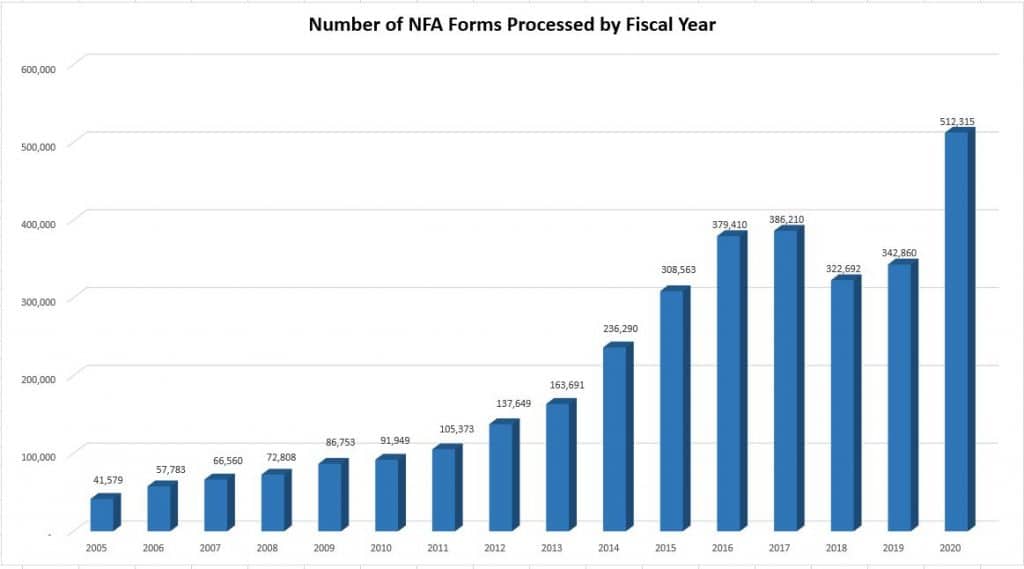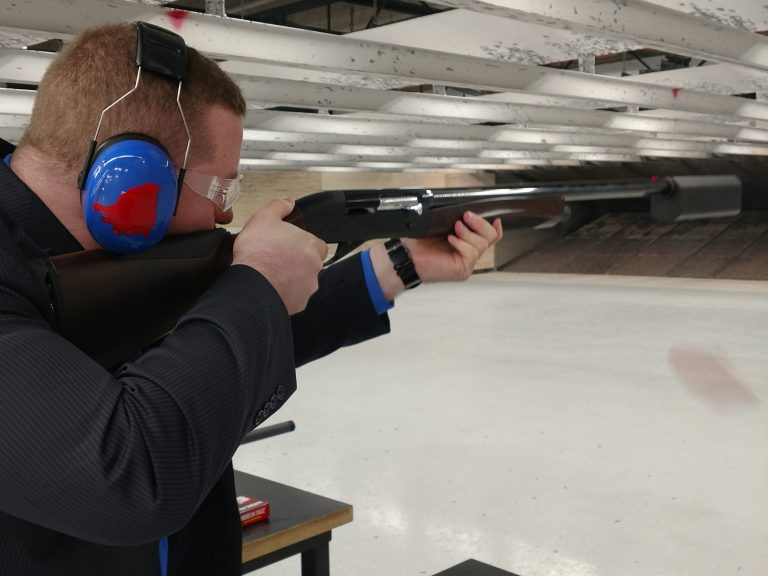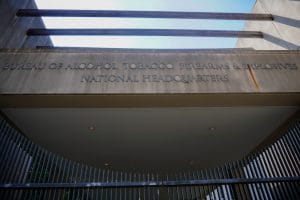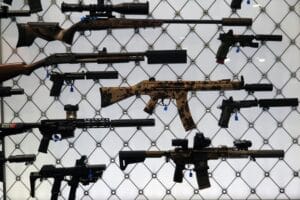The future is bright for the firearm sound suppressor market. Pre-existing trends combined with recent upgrades to the registration system indicate a suppressor sales boom is imminent. That could lead to normalization of the devices and even further demand.
What are suppressors, and how are they regulated?
Suppressors, commonly called silencers, were first patented by Hiram Percy Maxim in 1909 as a device to reduce the sound of gunshots. He later adapted the same technology into automotive mufflers. Modern suppressors can significantly reduce the noise of gunfire to the point where it is less damaging to the shooter’s hearing.
The devices have been heavily regulated since the National Firearms Act passed in 1934. To purchase a suppressor, buyers must live in a state where they are legal, send in an application including fingerprints and passport photos to the ATF, pay a $200 transfer tax, notify their Chief Law Enforcement Officer, and wait for the ATF to process the application and conduct a background check.
It’s a system that is far more onerous than the nearly-instantaneous process of buying a standard handgun or long gun from a licensed dealer in most states.
Public Safety Risks
Despite their frequent portrayal in Hollywood and video games as the criminal’s tool of choice, the reality is that the use of suppressors in crime is quite low. Previous data has shown that the ATF has identified approximately 44 suppressor-related crimes per year over the past decade.
Ronald Turk, former Associate Deputy Director of the ATF, once wrote in an agency memo that their limited use in crime did not warrant the current regulations placed upon them by existing federal law.
“Consistent with this low number of prosecution referrals, silencers are very rarely used in criminal shootings,” Turk said. “Given the lack of criminality associated with silencers, it is reasonable to conclude that they should not be viewed as a threat to public safety necessitating [National Firearms Act] classification, and should be considered for reclassification under the [Gun Control Act].”
Trends
According to the American Suppressor Association, an advocacy group, there were 285,000 lawfully obtained suppressors in circulation as of 2011 in the 39 states where they were legal to own. Only 22 of those states allowed their use while hunting.
The number of lawfully registered suppressors has shot up to nearly 2.7 million in 2021–more than doubling since 2017. Three more states have since legalized their ownership, while another 18 have allowed their use for lawful hunting.
Data from the ATF reveals a substantial upward trend in applications for NFA items, including suppressors, over the last decade. In fact, 2020 had the highest number of Form 4 applications–the form necessary when acquiring an NFA item–on record.

The agency’s latest move to offer an eForm 4, a completely digital version of the application, will almost certainly see this trend accelerate. The agency aims to reduce the current average wait time of eight months for processing a suppressor application to around 30 days by 2023.
With a major barrier to entry for suppressor ownership—time—set to be substantially diminished, it is reasonable to expect an even greater pool of prospective suppressor buyers.
Beyond procedural improvements, suppressor acceptance has recently been making progress in unlikely jurisdictions.
The pacific island territory of Guam, which sits firmly within the jurisdiction of the gun-control haven of the Ninth Circuit court of appeals, recently passed a bill legalizing civilian ownership of suppressors. To put it into context, the closest U.S. state to Guam is Hawaii, a jurisdiction notorious for its hostility toward liberalized civilian firearm laws and one which currently prohibits all civilian ownership of suppressors. Yet Guam’s legislature passed the bill on a bipartisan basis.
Beyond just the fact the bill passed, the contents of the legislation are also telling. The entire first section of the bill is dedicated to refuting popular misconceptions about suppressor ownership and laying out the practical, pragmatic case for their legalization.
“The public perception of the effects of firearm silencers or suppression devices have largely been exaggerated by movies and pop culture,” the bill said. “In reality, the reduction of noise produced by silencers and suppression devices is about thirty (30) decibels.”
The bill said the three main reasons to own suppressors are “reduction of noise pollution, hearing protection, and safety training” while noting they can provide protection comparable to some earmuffs. It adopted many of the points raised by gun-rights activists who have advocated for deregulation of suppressors in recent years.
“No one would ever suggest that a suppressor is an acceptable replacement for earmuffs, but suppressors are a very good supplement to reduce the sound that reaches the inner ear,” the bill said. “Using a combination of a suppressor, earmuffs, and earplugs can reduce the perceived sound to around one hundred (100) to one hundred twenty-five (125) decibels, the same as a power lawnmower or a jackhammer.”
Guam Governor Leon Guerrero (D.) vetoed the bill this week, but its initial passage is a strong indicator of where things are headed.
Just as the grass-roots proliferation of handgun ownership contributed to the liberalization in attitudes about their legality and the right to carry, a sustained increase in civilian suppressor ownership could very well change some hearts and minds about their legal status. Ubiquity breeds normalization, and suppressors have started their long march to ubiquity.







Only Members can view comments. Become a member today to join the conversation.